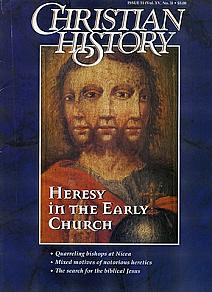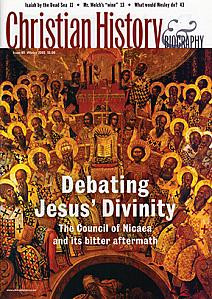Energetic Pulcheria Insisted Christ Is Both Divine and Human
IN THE FIFTH CENTURY, an energetic Christian woman ruled the Roman Empire.
When emperor Arcadius died in 408, his son, Theodosius II, was just seven years old. The boy’s temperament was that of a scholar or copyist of manuscripts, completely lacking heroism and qualities necessary for leading an empire. Fortunately, his older sister exhibited many of the qualities that he did not. On this day, 4 July 414, the senate proclaimed fifteen-year-old Pulcheria the Augusta (empress). As famous historian Edward Gibbon remarked, “She alone, among all the descendents of the great Theodosius, appears to have inherited any share of his manly spirit and abilities.” She was also thoroughly Christian in both outlook and training.
Pulcheria taught her brother to carry himself publicly so as not to disgrace the crown. Meanwhile, she managed imperial affairs with considerable skill. The church historian, Socrates, wrote, “She governed the Roman Empire excellently and with great orderliness.” Pulcheria’s authority was limited for a while by her sister-in-law Eudocia, wife of Theodosius II, but her counsel was still influential.
Pulcheria remained a lifelong virgin. She endowed many churches, provided for the poor, built hospitals and battled heresy—including being instrumental in bringing about the Council of Chalcedon. At Chalcedon, the church reaffirmed definitions of Christ that had been reached at earlier councils and again rejected the Nestorian teaching that denied that the Virgin Mary was the “Mother of God” or “God-bearer.” Pulcheria attended one session.
Following the death of her brother, Pulcheria was again proclaimed empress. One of her first orders of business was to suppress the heresy of Eutyches, which blurred the distinction between Christ’s human and divine natures, essentially leaving him only with the divine.
To strengthen the empire, she married a capable general named Marcian and had him proclaimed Augustus. One provision of their marriage was that she could remain a virgin. Pulcheria died in 453 as one of the most successful female rulers of history. In her will, she left all her private goods and estates to the poor.
—Dan Graves
----- ------ ------
Two issues of Christian History deal with the church's official statements about the theology of Christ and heresies that developed in attempts to understand its complexities. See Christian History #51, Heresy in the Early Church and #85, Debating Jesus' Divinity
Other Events on this Day
- ROBERT SHEFFEY WAS AN ECCENTRIC AND MEMORABLE PREACHER
- “Will You Be Coming to HEAVEN, Too?” Asked Dying Bray







